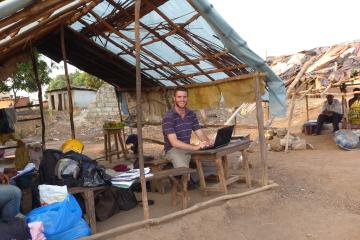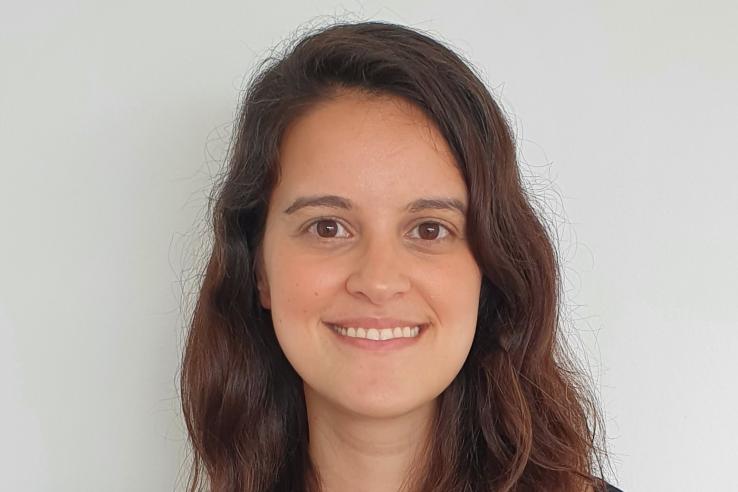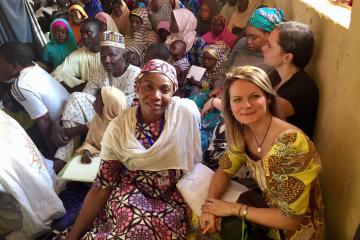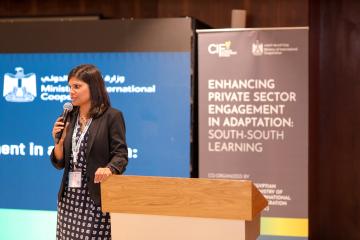
Carolina Morais Araujo, J-PAL '19, on scaling impact in LAC

The Alumni Spotlight series highlights J-PAL alumni who are making an impact across industries and around the world. Formerly a senior manager at J-PAL Latin America and the Caribbean (LAC), Carolina Morais Araujo ‘19 is now Associate Director at Delivery Associates.
What inspired you to build a career in the development and public policy space?
I completed my undergraduate studies in International Affairs in Brazil, and soon after graduation, I was accepted into the trainee program at Folha de S.Paulo, the largest Brazilian newspaper. Over the course of six years, I worked as a reporter and editor across various sections, including politics, sports, and the front page. My experience as a journalist allowed me to develop a wide range of skills. However, I often felt there was a gap between highlighting a problem—as journalism typically does—and actually contributing to solving the problem.
Driven by my desire to bridge this gap, in 2014, I decided to make a career transition and pursued a Master of International Affairs at Columbia University's School of International and Public Affairs. It was there that I discovered my interest and passion for evidence-to-policy work, which ultimately inspired me to pivot my career in this direction.
How did you first come across J-PAL?
During my master's program, “Poor Economics” and research papers by J-PAL affiliates were part of the syllabus in several courses, including Quantitative Analysis and Economic Development. Upon graduation, I sought positions that would allow me to apply the knowledge and skills I had acquired during my studies. Around this time, J-PAL LAC was looking for a Manager in Brazil to help expand the organization’s presence in the country and to support affiliates in identifying evaluation opportunities with the Brazilian government and other impact-driven organizations.
I was planning to go back to my home country, and I was encouraged by my classmate, Vincent Quan—who is now co-Executive Director at J-PAL North America—to apply for the position. It turned out to be excellent advice, and I had a rewarding experience working at J-PAL LAC, as a Senior Manager in Brazil, from September 2016 to January 2019.
What was it like to help establish J-PAL Latin America and the Caribbean’s presence in Brazil?
It was an incredible opportunity and an exciting challenge! During my time at J-PAL, I found that many public leaders, government officials, and impact organizations were highly interested in J-PAL’s work and expertise. This opened significant opportunities to collaborate on research, policy, and training projects across key policy areas such as environment, social development, education, and public safety.
I also felt privileged to be part of J-PAL LAC in a time of expansion into other Latin American countries, including Brazil, Mexico, Peru, and the Dominican Republic. Working closely with the leadership team based in Chile and partnering with managers in these countries was truly one of the highlights of my time at J-PAL.
However, the role was not without its challenges. Brazil was undergoing a period of political instability, leading to frequent turnovers among key government champions. Additionally, finding common ground between the needs of governments, the research agendas of affiliates, and the availability of funding often proved to be a complex and sometimes frustrating task.
What aspect of the job did you find most challenging and/or interesting?
Working with government officials who truly believe in the power of evidence-based policy and helping them enhance their evaluation skills was the most rewarding aspect of my work. I particularly appreciated the opportunities I had to scale up access to high-quality content and to contribute to capacity-building efforts.
One of my favorite projects was the development of a Massive Open Online Course (MOOC) on Impact Evaluation of Social Programs and Policies, in partnership with the National School of Public Administration (ENAP) in Brazil, launched in 2017. This was the first open, free, and online course on randomized evaluations in Portuguese, delivered by J-PAL affiliates, guest experts, and staff. In its inaugural year alone, nearly 6,000 people enrolled, and the course has since been offered annually by ENAP. Even today, I receive messages on LinkedIn from public servants who express their appreciation for the course, highlighting how accessible and valuable it has been for their work.
You left J-PAL to pursue a position at Delivery Associates, where you’ve been working closely with governments to embed effective policies at scale. Tell us more about your current work—and how did your time at J-PAL inform your work at Delivery Associates?
I currently serve as Associate Director for Latin America and the Caribbean at Delivery Associates, a global social impact consultancy specializing in transforming the public sector. We collaborate with governments, philanthropies, and international organizations to support policy implementation and deliver meaningful outcomes for residents around the world.
In my current role, I lead multi-country initiatives aimed at scaling up urban innovations and evidence-based interventions across various sectors, including public health, environment, agriculture, and economic development. My passion—and many times, my obsession—for scaling up initiatives began during my time at J-PAL, where the Generalizability Puzzle became a foundational reference for my work. Today, while I continue to support governments and impact organizations in advancing evidence-based policy, I constantly strive to find the right balance between practicality and rigor, a principle deeply ingrained in me by J-PAL.
At J-PAL, I also had my first experience overseeing strategy, operations, and organizational growth. The lessons I learned, the business skills I developed, and the entrepreneurial mindset I cultivated there have become very useful tools in my current work at Delivery Associates.
How have you seen the evidence-to-policy landscape change throughout your career? And what direction do you see it heading, particularly in LAC?
In my view, the evidence-to-policy landscape has made significant strides in recent years. For instance, I am currently involved in a program that supports city leaders in using data to enhance decision-making and governance. I’ve observed a growing trend where public leaders are increasingly demanding high-quality evidence to inform their decisions. Today, high-quality data and evidence are becoming more accessible, digestible, and actionable. Public leaders no longer need to be PhDs in Economics to effectively use evidence in their decision-making processes.
Additionally, the development ecosystem—international organizations, philanthropies, the private sector, NGOs, etc.—is playing a crucial role in supporting governments in advancing evidence-based policy. These entities are generating relevant and timely evidence that is better integrated into the policy cycle, making it easier for governments to deploy and apply evidence-based approaches.
What skills or experiences gained from working at J-PAL have you found useful in your own career?
One key skill that J-PAL helped me develop was the ability to ask the right questions. Good research always begins with a relevant question, and at J-PAL, I often heard: “Be passionate about the problem, not the solution.” This approach has continued to be invaluable in my work.
Another crucial skill I honed at J-PAL was building strong partner coalitions. In Latin America and the Caribbean, the success of a J-PAL project often relied on a tripod of collaboration between governments, researchers, and funders. Understanding the goals of each partner, identifying their common interests, and building a coalition focused on achieving real impact has remained a central skill throughout my career.
Finally, J-PAL provided me with my first experience working with multi-country, international teams. My colleagues at J-PAL LAC exposed me to diverse cultures, local realities, and different ways of working, all of which continue to inspire me as I strive to create inclusive and meaningful work environments. I once heard a piece of advice from my colleague Anne Thibault, former Deputy Executive Director at J-PAL LAC: “We must not only work hard, but we must also have fun at work.” This motto has become a guiding principle in my professional life.
In your current position, you work across many countries with different kinds of governments as well as philanthropic partners. What advice do you have for working with a wide range of partners that often have varying motivations and goals?
Building successful partnerships is essential for scaling up effective policies to reach millions of people in need. To maximize the reach and effectiveness of partnerships, I have found it useful to focus on three aspects:
- Be an active listener: Take the time to understand the motivations and common interests of all partners to foster trust and ensure that everyone is aligned towards a common vision.
- Define clear responsibilities: Establish clear roles, responsibilities, and governance structures from the outset.
- Focus on concrete impact goals: Drive the partnership towards achieving specific, measurable outcomes that have a significant impact on people's lives to keep momentum and ensure that the partnership delivers meaningful change.


